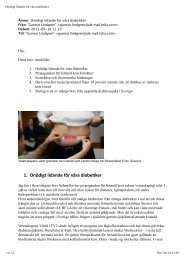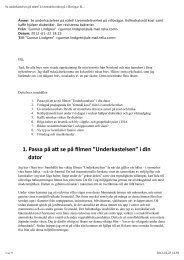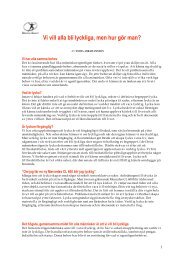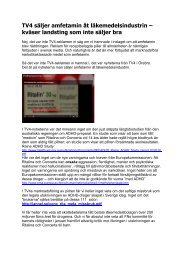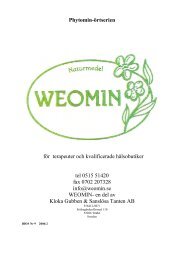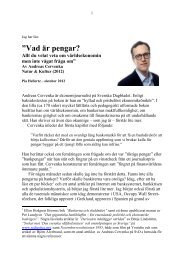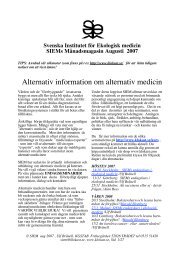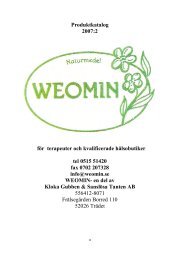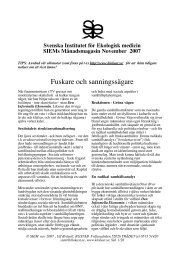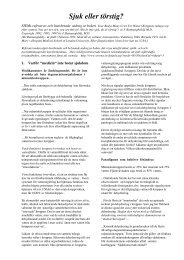Hexan i livsmedel, om barnmat, e.coligåtan, lågkolhydratkost samt ...
Hexan i livsmedel, om barnmat, e.coligåtan, lågkolhydratkost samt ...
Hexan i livsmedel, om barnmat, e.coligåtan, lågkolhydratkost samt ...
You also want an ePaper? Increase the reach of your titles
YUMPU automatically turns print PDFs into web optimized ePapers that Google loves.
<strong>Hexan</strong> i <strong>livsmedel</strong>, <strong>om</strong> <strong>barnmat</strong>, e.coligåtan, lågkolhydratkost...<br />
over-consumption of foods high in carbohydrates. He says high-carb foods are, in general, less filling, and people tend to get carried away with how much low-fat<br />
food they can eat. More than half of all American adults are estimated to be overweight, with a body mass index, or BMI, of 26 or higher; a third are considered to<br />
be obese, with a BMI of 30 or higher.<br />
Stewart says the key to maintaining healthy blood vessels and vascular function seems -- in particular, when moderate exercise is included -- less about the type of<br />
diet and more about maintaining a healthy body weight without an excessive amount of body fat.<br />
Among the researchers' other key study findings, to be presented separately at the conference, was that consuming an extremely high-fat McDonald's breakfast<br />
meal, consisting of two English muffin sandwiches, one with egg and another with sausage, along with hash browns and a decaffeinated beverage, had no<br />
immediate or short-term impact on vascular health. Study participants' blood vessels were actually less stiff when tested four hours after the meal, while<br />
endothelial or blood vessel lining function remained normal.<br />
Researchers added the McDonald's meal challenge immediately before the start of the six-month investigation to separate any immediate vascular effects fr<strong>om</strong><br />
those to be observed in the longer study. They also wanted to see what happened when people ate a higher amount of fat in a single meal than rec<strong>om</strong>mended in<br />
national guidelines. Previous research had suggested that such a meal was harmful, but its negative findings could not be confirmed in the Johns Hopkins'<br />
analysis. The same meal challenge will be repeated at the end of the study, when it is expected that its participants will still have lost considerable weight, despite<br />
having eaten more than the rec<strong>om</strong>mended amount of fat.<br />
"Even consuming a high-fat meal now and then does not seem to cause any immediate harm to the blood vessels," says Stewart. However, he strongly cautions<br />
against eating too many such meals because of their high salt and caloric content. He says this single meal -- at over 900 calories and 50 grams of fat -- is at least<br />
half the maximum daily fat intake rec<strong>om</strong>mended by the American Heart Association and nearly half the rec<strong>om</strong>mended average daily intake of about 2,000 calories<br />
for most adults.<br />
All study participants were between the age of 30 and 65, and healthy, aside fr<strong>om</strong> being overweight or obese. Researchers say that in the first study, because<br />
people were monitored for the period they lost the same amount of weight, any observed vascular differences would be due to what they ate.<br />
Presented June 3 at the annual meeting of the American College of Sports Medicine in Denver<br />
__________________________________________________<br />
Oljesituationen i världen<br />
Nyligen sammanträdde OPEC, de oljeproducerande ländernas samarbetsorganisation. Tvärt emot vad vi<br />
vill tro har förbrukningen av fossila bränslen ökat kraftigt under 2010 – mer än någonsin sedan 1973. För<br />
att försöka undvika en <strong>om</strong>edelbar brist på olja med höga priser, ville några länder in<strong>om</strong> OPEC att man<br />
skulle öka utvinningen. Men en rad andra länder sade nej, de vill behålla höga priser. De kan inte heller<br />
öka sin produktion längre. Det är bara Saudiarabien s<strong>om</strong> tycks ha en betydande reservkapacitet kvar.<br />
Detta talar för att svårigheter för vår <strong>om</strong>ättliga civilisation ligger bak<strong>om</strong> hörnet – inte decennier framför<br />
oss.<br />
ODAC Newsletter — 10 June 2011<br />
Welc<strong>om</strong>e to the ODAC Newsletter, a weekly roundup fr<strong>om</strong> the Oil Depletion Analysis Centre, the UK registered charity dedicated to raising awareness of peak oil.<br />
Oil prices surged as the OPEC meeting broke in acrimony with no agreement to raise production quotas. The Saudi oil minister said it was the worst meeting ever, and s<strong>om</strong>e<br />
analysts claimed the cartel, which controls around 40% of global oil supplies, is on the point of collapse.<br />
Traditional price hawks Iran and Venezuela ganged up with Libya, Algeria, Angola, Ecuador, Venezuela and Iraq to defeat the increase, proposed by Saudi Arabia, the UAE, Kuwait<br />
and Qatar, with voting largely determined by the distribution of spare capacity. Saudi, with three quarters of OPEC's estimated 4 mb/d spare capacity, and its allies, wanted to<br />
raise output to soften prices and protect demand. The rest had nothing to gain, at least in the short term; with no spare capacity to speak of, they would have suffered lower oil<br />
prices and not been able to raise output to c<strong>om</strong>pensate.<br />
The row illustrates OPEC's increasing irrelevance. Most members are running flat out and incapable of raising output even if they wanted to, and the power to influence the oil<br />
market is increasingly concentrated in Saudi Arabia, although many doubt they have as much meaningful spare capacity as claimed. With seasonal demand due to surge s<strong>om</strong>e 2<br />
mb/d by the end of the year, Saudi is now likely to raise output in any case, but this will reduce its spare capacity in the event of any further geopolitical spasms. Buckle up.<br />
2010 saw global energy use increase at its fastest rate since 1973, according to the latest BP statistical energy review released on Wednesday. Oil consumption rose to a record<br />
87.4 million barrels/day, (2008 was 86 mb/d), while coal consumption increased by 10%, driving a near 6% increase in greenhouse gas emissions. But it is natural gas that is<br />
shaping up to be the next big thing, according to a new report, "Are we Entering a Golden Age of Gas", fr<strong>om</strong> the IEA. According to the Agency, gas consumption could rise by<br />
50% by 2035, requiring global production to grow by three times the current output of Russia.<br />
The IEA's new scenario depends on a number of big and questionable assumptions, including that plentiful shale gas will keep prices low. But the watchdog makes clear the<br />
report's rosy-tinted title applies only to the industry, not the planet. The scenario cuts greenhouse gas emissions only fractionally c<strong>om</strong>pared to their central forecast, because gas<br />
backs out not only coal but also nuclear and renewables, and lower prices stimulate demand. Despite the industry's attempts to position natural gas a as 'clean', this high-gas<br />
scenario still ties us to a railroad track heading for a catastrophic 3.5C rise in global temperatures.<br />
_____________________________________<br />
Oljeutvinningen minskar i Norge och Danmark (Nordsjön)<br />
Jag har tidigare berättat att oljeutvinningen i Norge minskar snabbt. Nu k<strong>om</strong>mer samma besked från Danmark. Om några år räcker Danmarks olja bara till det egna<br />
behovet. Figurerna i artikeln nedan kan klickas att bli större.<br />
DANMARK<br />
Cornucopia blogg 2011-06-09<br />
När upphör Danmarks oljeexport<br />
S<strong>om</strong> bekant så är Danmark det land s<strong>om</strong> vi importerar tredje mest olja från 7ll Sverige och grannens<br />
oljeexport k<strong>om</strong>mer upphöra in<strong>om</strong> några år. Det råder lite delade meningar <strong>om</strong> när.<br />
4 av 9 2011-06-11 16.39



